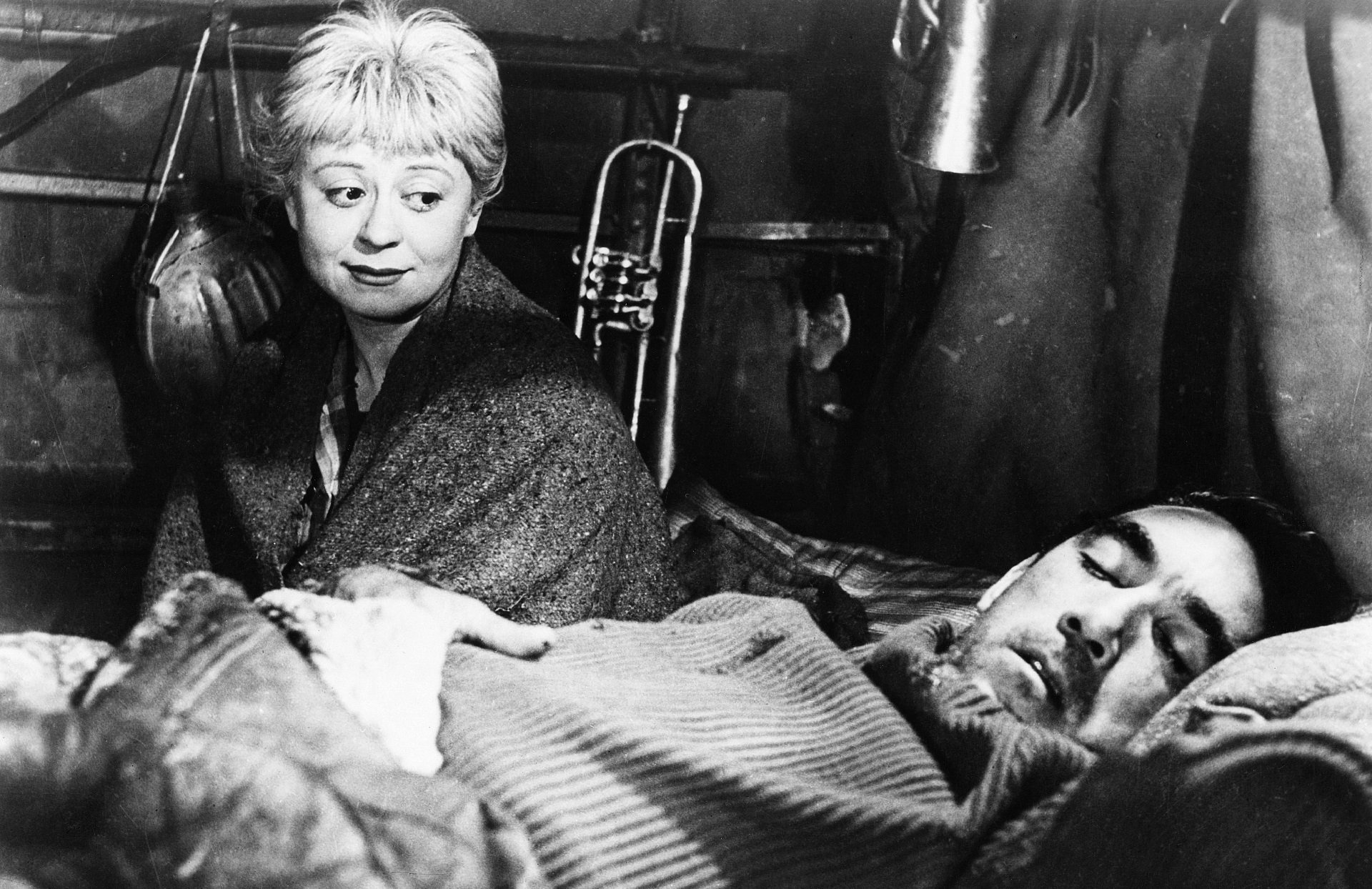Summary:
A jovial girl is sold to a traveling entertainer, and learns to endure life with all it’s ups and downs.
This is the image to which I refer.
My Thoughts:
Sometimes a character or image from a film is so engrained in popular culture that even non-cinephile would be familiar with them: Charlie Chaplin’s Tramp from any number of his films, Marilyn Monroe in “The Seven Year Itch”, Marlon Brando sitting in an office with the blinds drawn and a kitten in his lap from “The Godfather”… There is an image from this film of our hero Gelsomina (Giulietta Masina, “The Nights of Cabiria”) done up in clown makeup, and I remember knowing that image far before I ever saw this film, or even knew what the image was from. That image eventually brought me to this film, but for whatever reason I watched a few other Fellini films before ever getting around to this one. I must admit, while I did love this movie, I wont claim it to be better than Fellini’s masterpieces, “La Dolce Vita” and “8 1/2”, but it’s certainly a great film.
I don’t know for what this pebble is useful, but it must be useful. For if its useless, everything is useless.
“La Strada” tells the story of Gelsomina (Masina), a innocent young girl with an absent mind but a heart of gold. Gelsomina’s mother is forced to sell her to a traveling circus performer named Zampano (Anthony Quinn, “Lawrence of Arabia”) during a season of famine and poverty. As Gelsomina accompanies Zampano on his expeditions across the Italian countryside, she learns about the cruelties and hardships of life and love.
I suppose the thing that I like most about this film is the thing that I like most about every Fellini film: the direction. In all of his films, Fellini seems to cram as much life and into his films as he can; every single frame seems to drip with movement- people, animals, lights, automobiles, garbage, and so much glorious food- it doesn’t matter what’s in the frame, it just feels like there’s so much depth to the worlds Fellini shows us. Just in the background of this film there are dozens (if not hundreds) of extras used throughout the performance scenes, and each one has something that makes them an individual.
The writing, too, is another thing that keeps bringing me back to Fellini. His films are almost always able to ride a line between sweet and funny and heartbreaking and sentimental, and this film does just that. There are scenes where we really get glimpses into Gelsomina’s mind and how she thinks about the world; she truly is innocent, but as the world slowly starts to eat away at her, he innocence begins to erode. It’s heartbreaking to watch her good-hearted nature begin to take on tarnish as the film continues, but Fellini always gives us a little bit of hope.
While Gelsomina’s character is full of warmth and love and joy, Zampano views the world as a cold and heartless place. Perhaps the saddest storyline of this movie is Gelsomina’s quest to bring joy to Zampano. Despite all her attempts, he seems absolutely set on being depressed and ignoring the love she gives him. He drinks too much, beats her when she doesn’t perform the way he wants her to, leaves her on the streets so he can have sex with another woman… The way he treats her is horrible, but Gelsomina continues to return to Zampano over and over again, only adding to tragedy. One of the best scenes of this film is when Gelsomina talks with another circus performer who goes by the name “The Fool” (Richard Basehart, Moby Dick). The aptly named Fool shares a lot of the same sentiments that Gelsomina has about the world, and in the end their fates are rather similar. In the scene when the Fool and Gelsomina talk, however, there’s a moment when the Fool insists that all of this must be for something- that even the smallest parts of the Earth have a purpose. It’s here where Fellini excels: he shows s the world as it is, but he’s not afraid to urge us to hope for something better. The ending of this film is tragic, but we still can have hope that the lives of all of these characters were not meaningless.
Verdict:
Fellini is a brilliant director, and the more I watch his films, the more I fall in love with him; there’s a reason his name often comes up with the best of the best. This film, while not Fellini’s best, is certainly worth a watch for both cinephiles and casual moviegoers alike.
Review Written By:





